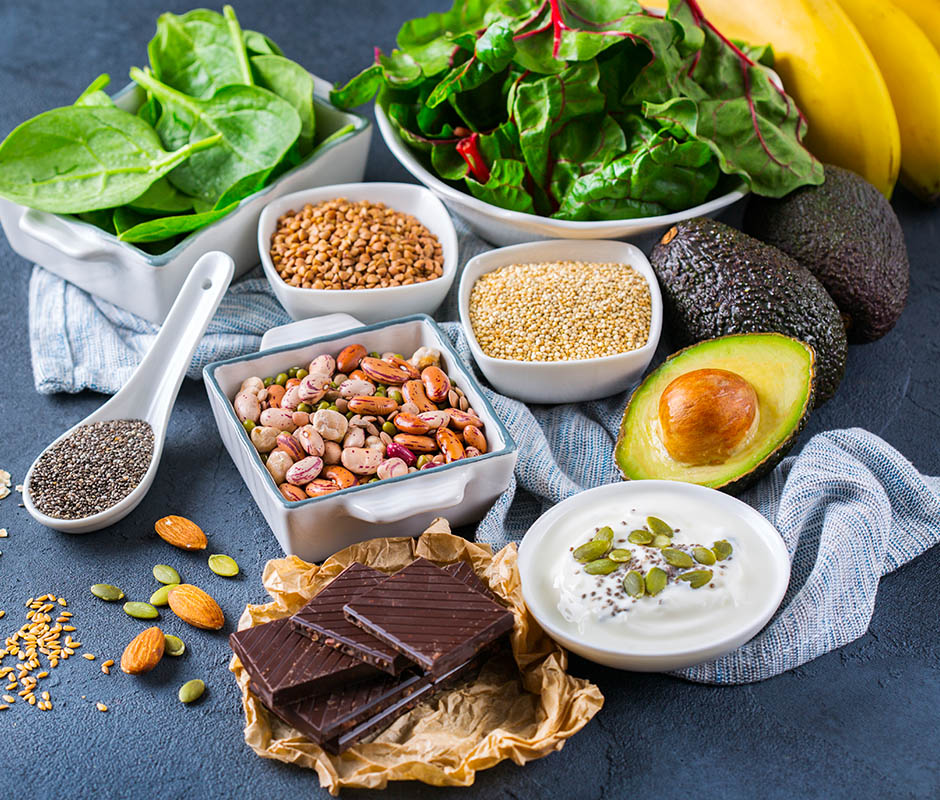Stop Brain Ageing with Magnesium
Posted on : March 25, 2024
Stop Brain Ageing with Magnesium by Ashleigh Feltham Accredited Practising Dietitian and Accredited Nutritionist
 Magnesium is an overachiever. It is an essential major mineral for over 325 different body functions, including muscle contractions, blood pressure, sleep quality, bone strength and reducing stress.
Magnesium is an overachiever. It is an essential major mineral for over 325 different body functions, including muscle contractions, blood pressure, sleep quality, bone strength and reducing stress.
Magnesium deficiency is common; one in three Australians over the age of two are not obtaining enough magnesium in their diet. More men are falling short of meeting their estimated average requirements at 37% compared to women at 34%.
One of the functions magnesium supports is brain function. It has been found that a higher level of magnesium in the brain is linked to lower amounts of oxidative stress and systemic inflammation. A higher level of magnesium in the brain is also linked to increased synaptic plasticity, or an increase in the strength of connections and communication between brain cells. A higher level of magnesium in the brain may help to reverse degeneration.
A recent study links the role of magnesium with brain health. This study is the first of its kind to use neuroimaging and structural brain measures in humans to investigate the effects of magnesium on the brain. Participants were men and women aged 40-73 years.
This study found that a higher magnesium intake results in more grey matter. Those who consumed the most dietary magnesium, 550mg a day or more, compared to the average daily magnesium intake, approximately 350mg, had approximately 0.2% larger grey matter volume. They also had approximately 0.46% larger right hippocampal volume.
With an average age in this population of 55 years, these amounts in brain mass correspond to around one year of aging in the brain. This may help reduce the onset or delay the progression of dementia. This prediction is supported by other research that has linked a higher daily magnesium intake of 196mg to a 37% decreased risk of developing dementia.
Good sources of magnesium from whole foods include avocado, dark chocolate, nuts, seeds, beans, whole grains like oats, brown rice and quinoa, tofu, edamame, bananas, poultry and fatty fish like salmon. One hundred grams of red salmon, canned in brine and drained, has 26mg of magnesium. One hundred grams of pink salmon, canned in brine and drained, has 30mg of magnesium. Lean meat, leafy greens and potatoes are other great sources of magnesium.
A balanced diet including sufficient amounts and varieties from each food group will ensure you reach your magnesium needs. Include two to three serves of seafood each week as part of a balanced diet. One serve is 100g of cooked-weight seafood.

Take home message
If you are not meeting your daily magnesium needs, try adding some of the foods listed above. Meet your daily magnesium needs to maintain your body and its functions, including brain health.

References:
- Australian Health Survey: Usual Nutrient Intakes, 2011-12 financial year. Australian Bureau of Statistics. 2021.
- Alateeq K, Walsh EI, Cherbuin N. Dietary magnesium intake is related to larger brain volumes and lower white matter lesions with notable sex differences. Eur J Nutr. 2023 Aug;62(5):2039-2051. doi: 10.1007/s00394-023-03123-x. Epub 2023 Mar 10. PMID: 36899275; PMCID: PMC10349698.
- Shang X, Hill E, Zhu Z et al (2021) The association of age at diagnosis of hypertension with brain structure and incident dementia in the UK biobank. Hypertension 78:1463–1474.
- Li W, Yu J, Liu Y et al (2014) Elevation of brain magnesium prevents synaptic loss and reverses cognitive deficits in Alzheimer’s disease mouse model. Mol Brain 7:65.
- Australian Food Composition Database – Release 2.0, Food Standards Australia and New Zealand.



